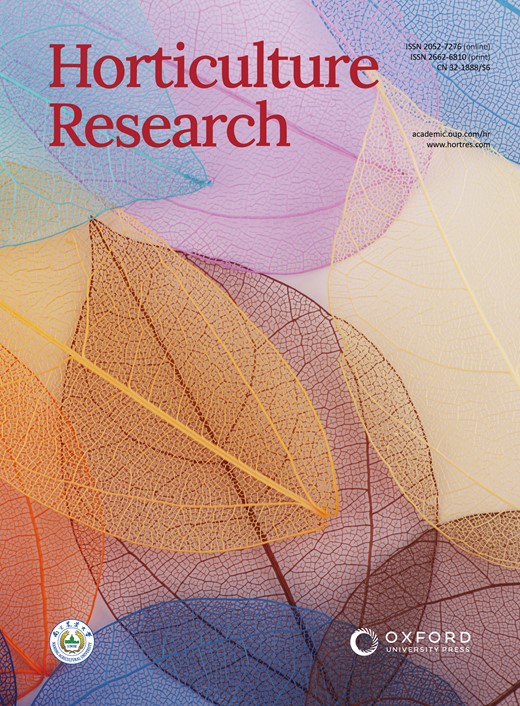组蛋白去乙酰化酶 SlHDA7 对番茄果实成熟和货架期的影响
IF 8.7
1区 农林科学
Q1 Agricultural and Biological Sciences
引用次数: 0
摘要
果实成熟取决于成熟相关基因表达的准确控制,而组蛋白去乙酰化酶(HDACs)在转录调控中起着至关重要的作用。然而,HDACs 在果实成熟过程中的功能在很大程度上仍未得到探索。在这里,我们发现 SlHDA7 是番茄果实成熟的抑制因子,并作为 H4ac HDAC 起作用。缺失 SlHDA7 会加速果实成熟,而过表达 SlHDA7 则会延迟成熟过程。此外,slhda7突变体果实的乙烯产生和类胡萝卜素生物合成显著增加,而SlHDA7过表达果实的乙烯产生和类胡萝卜素生物合成则显著减少。此外,SlHDA7抑制了乙烯生产和信号转导、类胡萝卜素代谢、细胞壁修饰和转录调控相关基因的表达。RT-qPCR 和 ChIP-qPCR 分析表明,SlHDA7 可使 H4ac 去乙酰化,导致 ACO1、GGPPS2、Z-ISO、EXP1 和 XYL1 mRNA 的转录水平降低,从而抑制果实成熟。此外,SlHDA7 通过靶向特定的成熟相关转录因子(TFs),如 RIN、FUL1 和 ERF.E1 等,抑制果实成熟,最终导致果实延迟成熟,延长果实货架期。总之,我们的研究结果表明,SlHDA7 通过调整这些成熟相关基因和关键转录因子的 H4ac 水平,对番茄果实的成熟起着负向调节作用。本文章由计算机程序翻译,如有差异,请以英文原文为准。
Histone deacetylase SlHDA7 impacts fruit ripening and shelf life in tomato
Fruit ripening depends on the accurate control of ripening-related genes expression, with histone deacetylases (HDACs) playing crucial roles in transcriptional regulation. However, the functions of HDACs in fruit maturation remain largely unexplored. Here, we show that SlHDA7 acts as a suppressor of fruit ripening and functions as an H4ac HDAC in tomato. Deletion of SlHDA7 accelerated fruit ripening, while overexpression of SlHDA7 delayed maturation process. Additionally, ethylene production and carotenoid biosynthesis significantly increased in slhda7 mutant fruits but decreased in SlHDA7-overexpressing fruits. Furthermore, SlHDA7 repress the expression of ethylene production and signaling, carotenoid metabolism, cell wall modification, and transcriptional regulation-related genes. RT-qPCR and ChIP-qPCR analyses indicated that SlHDA7 may deacetylate H4ac, leading to reduced transcript levels of ACO1, GGPPS2, Z-ISO, EXP1, and XYL1 mRNA, consequently suppressing fruit ripening. Moreover, SlHDA7 suppresses fruit ripening by targeting specific ripening-associated transcription factors (TFs) like RIN, FUL1, and ERF.E1, ultimately leading to delayed ripening and prolonged fruit shelf life. In summary, our findings indicate that SlHDA7 negatively modulates tomato fruit maturation by adjusting H4ac levels of these ripening-associated genes and key TFs.
求助全文
通过发布文献求助,成功后即可免费获取论文全文。
去求助
来源期刊

Horticulture Research
Biochemistry, Genetics and Molecular Biology-Biochemistry
CiteScore
11.20
自引率
6.90%
发文量
367
审稿时长
20 weeks
期刊介绍:
Horticulture Research, an open access journal affiliated with Nanjing Agricultural University, has achieved the prestigious ranking of number one in the Horticulture category of the Journal Citation Reports ™ from Clarivate, 2022. As a leading publication in the field, the journal is dedicated to disseminating original research articles, comprehensive reviews, insightful perspectives, thought-provoking comments, and valuable correspondence articles and letters to the editor. Its scope encompasses all vital aspects of horticultural plants and disciplines, such as biotechnology, breeding, cellular and molecular biology, evolution, genetics, inter-species interactions, physiology, and the origination and domestication of crops.
 求助内容:
求助内容: 应助结果提醒方式:
应助结果提醒方式:


